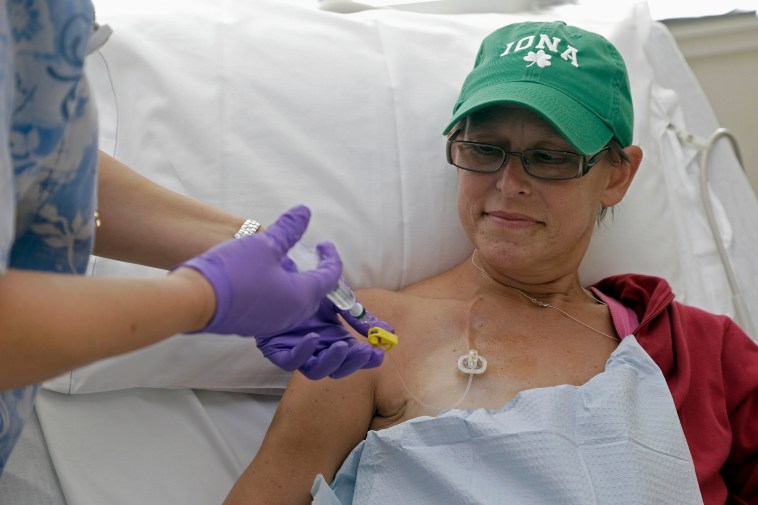WASHINGTON (AP) — Coping with advanced cancer, Bev Veals was in the hospital for chemo this summer when she got a call that her health plan was shutting down. Then, the substitute insurance she was offered wanted her to pay up to $3,125, on top of premiums.
It sounds like one of those insurance horror stories President Barack Obama told to sell his health overhaul to Congress, but Veals wasn’t in the clutches of a profit-driven company. Instead, she’s covered by Obama’s law — one of about 100,000 people with serious medical issues in a financially troubled government program.
Raw political divisions over health care have clouded chances of a fix for the Pre-Existing Condition Insurance Plan, leaving families like Veals and her husband Scott to juggle the consequences. That’s not a good omen for solving other problems that could surface with “Obamacare.”
“You don’t advertise one thing and then give the customer another thing,” said Veals, 49, who lives near Wilmington, N.C. “I finally felt for the first time going through this cancer that I had something dependable, and somebody pulled the plug.”
In a statement, the federal Health and Human Services department said the program “continues to provide excellent coverage.” But the department said it was unable to provide current enrollment numbers, which might reflect the impact of belt-tightening this summer that led North Carolina and 16 other states to turn their programs over to federal officials.
Known as PCIP, the program was intended as a temporary lifeline for people denied insurance because of medical problems. It’s supposed to provide coverage at premiums that healthy people would typically pay. PCIP will end Jan. 1, when Veals and other enrollees will be able to transition to new insurance marketplaces where they may be able to find lower-cost plans.
Jan. 1 is also when Obama’s law will forbid insurers from turning away people in poor health. At the same time, virtually all Americans will be required to have coverage. Many who are currently uninsured will be able to get tax credits to help pay premiums.
Part of the problem with PCIP stems from a decision by the president and Congress more than three years ago to cap funding at $5 billion. Some experts warned that might not be enough to last through the end of 2013.
Veals is a breast cancer survivor now battling colorectal cancer. A runner, she has participated in more than 125 fundraising races for cancer research. Her husband Scott is self-employed, a slow-motion replay operator for televised sporting events.
Bev Veals had been uninsured for 27 months before she was able to get on the North Carolina PCIP plan early in 2011. She considers herself a strong supporter of Obama’s law.
But even with insurance, deductibles and copays for cancer care strain the budgets of most families. And that doesn’t count lost wages and expenses not covered by insurance.
“It starts as a hand-packed snowball that someone starts pushing down the hill,” saidVeals. “It gains momentum and speed, it gets bigger and bigger, and swallows everything in its path.”
The more than $3,000 extra the Veals will have to pay this year “is not discretionary money,” she explained. “This is heat-the-house-in-the-winter money.”
When her home health nurse called her at Duke Cancer Center about the health plan changes, Veals was on a chemotherapy pump. Her first thought was they missed a payment. Then she remembered her premium was set for automatic payment and wondered if their account was low. Her mind racing, she worried somebody had hacked their finances.
Scott Veals called the North Carolina PCIP plan and learned it was being turned back over to the federal government on July 1 because of financing problems. After more digging, he found out their premiums would go down somewhat in the federal plan, to $420 a month.
But there was a catch: They had already met their deductible in the North Carolina plan, and also reached their annual out-of-pocket maximum of $6,250.
With the federal plan, they would have another deductible of $1,000 for the rest of 2013, and a total of $3,125 in out-of-pocket costs before reaching that plan’s catastrophic limit. Deductibles and copayments shift some financial responsibility to patients.
“We are paying 18 months of deductibles and out-of-pocket cost for one year’s worth of coverage to two insurance companies,” said Scott Veals.
The problems with PCIP bubbled up in February, when federal officials unexpectedly announced an enrollment freeze. Although fewer people had signed up than originally expected, very costly cases were draining its budget.
A few months later, federal officials gave states running their own PCIP plans an ultimatum: take on some financial risk or turn the programs back to Washington at midyear. In those 17 states, Washington put in new cost-sharing requirements to help keep the program financially viable through the end of the year.
If the administration saw problems coming, Obama’s budget did not reflect it. The president did not request any new funds for PCIP.
The No. 2 House Republican did make an attempt to pump more money in, but it was fraught with politics. Majority Leader Eric Cantor of Virginia proposed to divert funds from elsewhere in the health care law, unacceptable to Democrats. His idea also failed to get Republican support.
“Our elected officials, some of whom have been impacted by cancer, must come together to identify a bipartisan solution to fund this program for the remainder of 2013,” said Emily Shetty, who handles federal policy and lobbying for the Leukemia & Lymphoma Society.
Veals and her husband say they are looking forward to full implementation of the health care law next year. But getting through the next few months will be a struggle.
“We both knew there would be bumps along the road but we never thought there would be this kind of bump,” she said.
Videos By Rare
Copyright 2013 The Associated Press. All rights reserved. This material may not be published, broadcast, rewritten or redistributed.

